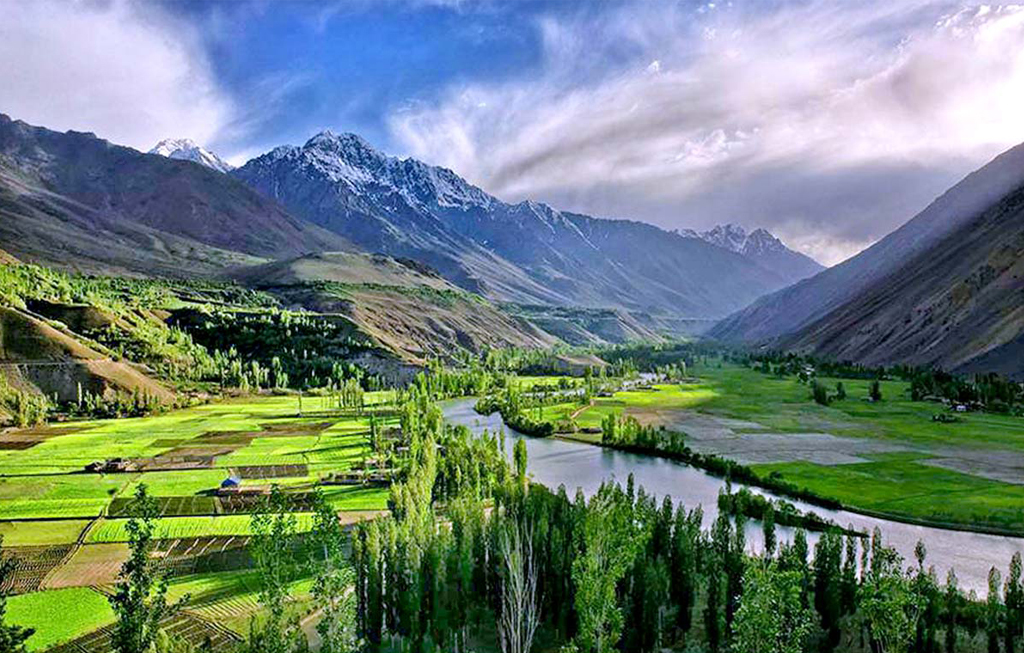Soon after media reports surfaced earlier this month that Islamabad is considering to give Giglit-Baltistan (GB) the status of a province, many GB-residents began worrying about the cost of bread on fears that the region might not receive subsidized wheat, as it currently does, once it becomes a province.
One is not sure if these worries are well founded since the region provides subsidized water to the rest of Pakistan, which is reason enough to be at least receiving subsidized wheat. But while some are worried about the cost of bread, others are joyful not only because of widespread patriotic sentiments for Pakistan but also because of the likely increase in the price of real estate owned by them.
However, regardless of the provincial status, the GB government needs to start thinking about the economic possibilities of the people of the region. As urban and modern lifestyles gradually make inroads into the region alongside a swarming growth of domestic tourists and improved education levels, the traditional lifestyles of farm-based livelihoods are altogether gone in some places or is on the way out in many others. Instead, there is a mushroom growth of mom-and-pop hotels and restaurants in places where families once grew potatoes, kept cows and had orchards.
Pinning hopes to the CPEC, Federal Minister for Information and Broadcasting Senator Shibli Faraz said last month that Gilgit-Baltistan would emerge as an economic ‘base camp’ of the country due to its strategic location on the CPEC route.
Good intentions aside, Shibli’s wish appears to be higher than the Himalayas. Given the mountainous nature of the region and small land sizes, large scale farming is rather difficult as is the setting up of large (or even) medium scale industrial units whereas the scope of repacking, warehousing, reexports and other facets of trade opportunities spilling from the corridors is also fairly limited in the near to medium term.
These constraints imply that tourism sector will invariably be the biggest employer of the region at least over the next decade or two, where sustainability ought to be made integral to the development of the sector rather than an important but secondary affair. To this end, GB government needs to take a host of steps.
To begin with, it should consider imposing litter tax in octroi mode. Local governments of the region should be allowed to collect garbage tax based on the cost of collection, processing and disposal unique to their area without routing that money through GB government. This may be complicated but not undoable; the octroi mode is premised on the fact that the cost of collection varies from region to region; Deosai, K2 base camp, Heligkoffer, Frano, Hushe, Hon Pass have different costs as against downtown Skardu and Gilgit.
Secondly, taking a cue from many other mountainous regions of the world that aspire for sustainability, GB should enforce sustainable construction featuring inter alia use of local materials and sustainable sanitation practices. Third, whilst domestic commerce cannot be banned, GB government should nevertheless discourage the use of packaged milk and water sourced in plastic bottles and tetra packs from the rest of Pakistan. These two kinds of packaging alone are adding significant heaps of unsustainability to the region.
One way to work around the situation is to encourage and incentivize water treatment plants in the region that can provide piped water to houses, hotels and restaurants, and also sell water in markets, albeit in packaging more sustainable than recyclable plastics. Awareness and confidence building campaigns should be undertaken to encourage tourists to consume locally sourced water in sustainable packaging rather than buying water bottles packaged in plastics half-way across the country. To this end, PTDC and leading hotels in the region such as Serena ought to be nudged towards selling local mineral water to their customers.
Similarly, efforts should be made to set up small milk pasteurization units that can supply locally produced milk to homes, hotels, and restaurants. Small units of milk pasteurization come as cheap as $1000-1500 with processing capacity of up to 200-400 liters per hour. Whilst this measure too will also require awareness and confidence building exercises, it will also require GB government to invest in increasing the milk yields of its local breeds which currently do not yield more than 5-6 litres of milk per day. Setting up local milk and water industries will not only help towards sustainability but also provide livelihoods, of which a host of new opportunities need to be created for the people of the region.
Since urbanization has outstripped the pace of education and vocational training in the region, there is a great mismatch of demand-supply of labour, where even services like trained tour guides are in short supply, let alone auto mechanics, cooks, furniture workers, health and education professionals. GB should facilitate the vocational training industry.
In addition, there are immense prospects of the development of solar energy market and training workers thereof, whereas gem mining and processing industry is another area that warrants attention. In the case of later, the Covid-led slowdown in tourism has already forced many Baltis from Kohistan region to explore prosects in gems and precious stones. However, since there isn’t adequate supply of trained artisans and machinery to process these stones, GB residents are not able to earn value-added margins on these stones.
Then of course farm to market supply chain and logistics ought to be developed where there is a pressing need to ensure air cargo services even if subsidized until the market picks up. Lastly, there is a need to explore the prospects of GI-tagging of traditional stoneware cooking utensils, handicrafts, unique breeds of apples, apricots and other fruits and other such possibilities, which in turn could potentially help GB locals earn better margins in overseas markets.




























Comments
Comments are closed.